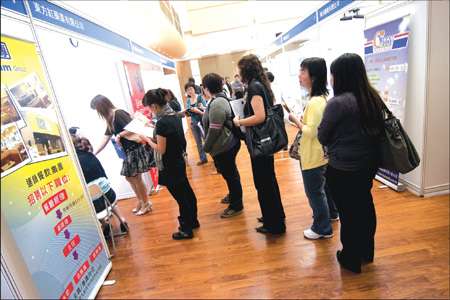Facing Poverty
Updated: 2009-11-21 08:38
By Bu Yunfei(HK Edition)
|
|||||||
|
Job seekers are busy filling their application forms at a job fair in October organized by the government. Bloomberg News |
|
A shopper rides the escalator in a garment store in Central, Hong Kong. Bloomberg News |
To any casual traveler to Hong Kong, the city never fails to project the image of glittering elegance: skyscrapers arrayed along its shores, neon signs and logos proclaiming internationally renowned brands, eats and treats, every element making up the full image of the modern metropolis.
The fleeting impressions of busy streets, complete with omnipresent pret-a-porter designer wear and cutting-edge durable goods, miraculously render into oblivion the lives of nearly one-sixth of the city's residents whose hand-to-mouth existence and daily struggle for survival are neatly concealed.
"You see mini-ads of iPhones, latest SLR cameras, all sorts of cosmetic facelift and diet programs, and the newest real estates on buses, at MTR stations, and by the roadside. They are there, but irrelevant to me and thousands of people like me," said Sophia Kan, newly graduated from City University with a major in social work.
Kan, who just began her career as a secretary at a local charity organization, gets by on her anemic monthly salary, buying only "what is absolutely necessary." Her income goes almost entirely to pay rent for the tiny public estate flat she shares with her mother and sister, to repayments on grant loans for her studies, and groceries. Kan's father left the family 10 years ago and has since remarried.
Kan is one of the thousands of youngsters in Hong Kong who grew up in a family officially classified as "poor." In Hong Kong, "poor" describes a family whose income is less than half of the city's median.
Members of these families, usually live in public project flats. They survive on piecemeal menial labor. Like most children living in poverty, Kan had to endure clothing handed down from her elder sister, an obsolete computer given her by her cousin, doing homework on a desk that doubles as a dressing table. She never dreamt of owning a Barbie girl or a Teddy bear.
"Mom always took me to Toys R Us to play with the most popular toys for free," Kan said. "She told me I can only play in the store because the toys cannot be taken outside."
Although a full-time employee at a reputable job, Kan continues to share a bunk bed with her sister. The 20-year-old bed, assembled by their handyman father, is a rigging of two single beds connected by a ladder found at a reclamation depot. The bed sits in their four square-meter room, with a wall that is a patchwork, pieced together by seven colors of wallpapers-the archetype of mismatch.
Despite her poverty, Kan considers herself fortunate that she is not poverty-stricken, at least not to the point of living in a tumbledown iron-sheet house or even being on the streets. In the night time shadows just beyond the blazing of the neon thousands of homeless people emerge to make their way to what they call shelter. They find their way to MTR stations, sleep under bridges, even on the pavement. A man who "settles down" under an overpass at Wan Chai scavenges and sells cardboards earning him HK$10-20 a day. It's all that keeps him alive.
According to the statistics released in September 2009 from the General Household Survey of the Census and Statistics Department, more than 1.23 million people - about one in six in Hong Kong - are living in poverty, with the percentage rising from 17.6 last year to 17.9 this year.
Although the numbers seem daunting, people, especially children who fall into the class of "poor" people, feel marginalized by society as a whole, physically and psychologically.
Citing an official report released in October, the proportion of poor children in Hong Kong has become the highest among all developed countries and regions throughout the world. The number rose to a peak of 20 percent, or 176,000 people, in the first quarter of 2009.
Children living in poverty are deprived the sort of social activities considered normal and indispensable by people who are better off. Research found that kids in this social stratum are more likely to feel alienated and inferior.
Mrs. Chan, a single mom with a boy suffering mild depression, says on her income from her janitorial jobs, she cannot afford to pay for extracurricular activities at her son's school. "I hope my son can have the opportunity to take part in piano or drawing courses with other kids. But that costs money...money that I don't have," she said.
Deepening poverty in Hong Kong has also elevated concerns among local non-government organizations about domestic negligence or even abuse.
Sonya Ma, an officer at the Salvation Army, said that domestic conflicts are more likely to take place in poor families than in more affluent ones, owing in part, to lack of education among parents. "The scar of poverty will leave an indelible mark on these children," said she.
In past years, the Hong Kong government has relied on the Comprehensive Social Security Assistance (CSSA) Scheme and Social Security Allowance (SSA) Scheme to relieve poverty. The drop in the 2008-2009 price index that regulates social assistance payments, moved the Hong Kong Labor and Welfare Department to propose freezing standard monthly payment rates at HK$3,871 per adult and an additional HK$1,000 per elderly person over 65.
Several lawmakers suggested ignoring the index and raising the social security allowances, commonly known as "fresh fruit money." Their effort failed.
Frederick Fung urged the government to adjust social assistance by considering additional factors. "Actually most CSSA recipients had difficulties in paying rents since rentals for even cheap flats increased during financial tsunami," he said.
Scholars are also worried about the current scale for welfare provision. "The inflation rate will probably reach 3-5 percent next year, which will add to the financial burden of the poor," predicted Nelson Chow, professor of Department of Social Work and Social Administration, Hong Kong University. He suggested the government face this problem and take precautionary measures.
People who object to the scheme claim that CSSA simply fuels hand-outs. That portion of local residents who are less educated are only expected to perform the lowest and cheapest forms of physical tasks such as construction and janitorial jobs.
"If people get the same income whether they work or not, why do they choose to work?" said Sonya Ma. She is one who fears that more people will quit working in order to receive nearly the same amount from Social Welfare, creating a potential for rampant abuse. There is a rising public outcry for the government to assist the poor in more active ways, such as supplying transportation and child care allowances to people who work outside. That, they say, would provide incentives to stay on the job and earn their income.
(HK Edition 11/21/2009 page3)

